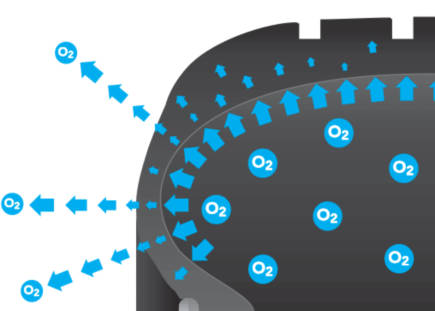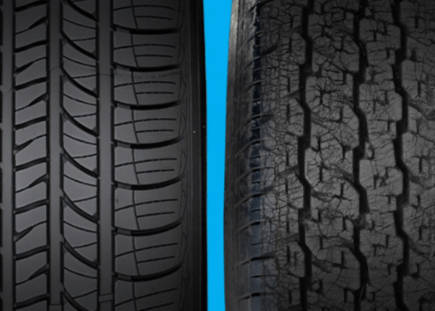Let's get down to business. Tires: how long should they last?
When it comes to tire safety, there are many variables. Things like treadwear, tire stopping distance, and even tire repairs can impact when you need to replace your tires. Another huge factor is tire age.
While we recommend replacing your tires at 6 years of age, you can't just assess your tire's life based on how old it is. A tire's lifespan is determined just as much by the conditions a tire is exposed as it is by calendar years. Temperature changes, sun exposure, storage conditions, usage and maintenance schedules all contribute to how a tire ages.
It's impossible to determine a tire's exact life expectancy because there's no way to account for the level of influence any one of these factors may have on a tire. But you can defer to the vehicle and tire manufacturer replacement recommendations:
- Vehicle manufacturers recommend tire replacement at 6 years.
- Tire manufacturers' warranties expire at 6 years.
- Tire manufacturers recommend replacement at 10 years, regardless of tread depth.
America's Tire recommends that you replace your tires after 6 years of age, regardless of tread depth. For your safety, we will not service a tire that exceeds 10 years of age.
You can find your tire’s age in its DOT Identification Number, which you’ll find stamped on the tire’s sidewall. The last four digits of this number indicate the week and year the tire was built.
Wondering why the experts all recommend replacement at 6 years? It’s not an arbitrary number; tires tend to lose a lot of their safety and performance capabilities past the 6-year mark. Let’s break down how tires age to find out why.
Tire Aging Process
Tires contain anti-aging properties known as antiozonants that help the rubber stay soft, flexible, and grippy. But over time, air will still permeate the tire wall and weaken the tire's structural integrity. Known as oxidation, this process causes the tire to become brittle and lose strength.
And that's not the only way tires age. Other factors can cause tires to lose their gripping power and overall effectiveness. Research conducted by the National Highway Traffic Safety Administration (NHTSA) maintains that tires age more rapidly in heat. Warm climates and exposure to direct sunlight can accelerate oxidation and speed up the aging process.
That's why tires equipped on vehicles that are stored outdoors, such as trailers or RVs, age faster than tires on vehicles stored in a garage.

Tires will also age faster if they're not cared for properly. If tires are driven while overinflated or underinflated, internal damage could occur that may not be detected through visual inspection. Impacts, punctures and improper tire repairs may also cause damage that can dramatically decrease your tire's lifespan.
To reduce these risks, we recommend regular air pressure checks, tire safety inspections and routine tire maintenance. And luckily for you, we provide all of those services (many of them free of charge)!
Less Than 6 Years Old:
These tires should deliver dependable performance, but keep an eye on your tire's treadwear, as it directly impacts grip in adverse weather.
For maintenance, you should perform a monthly inspection, including an air pressure check. Rotate every 6-8,000 miles and balance every 12-16,000 miles. Avoid extreme heat if possible.
6-10 Years Old:
Even if your tires are properly maintained, they may reach the end of their service life at 6-10 years. Improperly maintained tires will likely have a shorter lifespan.
Tires of this age probably have little remaining tread depth, reducing traction, stability and puncture resistance no matter the weather. They may also have cracking or structural damage caused by oxidation and environmental exposure.
At this stage, we recommend replacing your tires. If you're not ready for replacement, it's a good idea to have them inspected more often, with air checks once a month at a minimum.
Over 10 Years Old:
Any tire over ten years old is too weak to ensure safe driving. At this age, you must replace your tires. For your safety, we will not service any tires aged 10 years or older.
When Should I Replace My Old Tires?
If you have a long commute or drive often, your tires may wear out before the rubber deteriorates. Logging over 12,000 miles per year – the average rate for American drivers – may wear tread down to 3/32'' within three to four years. That means you might need new tires before age and environmental exposure become an issue.
But, advancements in tread life have made tire aging a more pertinent issue. Some of today's most advanced tires have an 80-90,000-mile treadwear warranty.
Particularly of concern on vehicles driven infrequently (ie RVs, trailers, weekend cruisers), your tires may need to be replaced before treadwear becomes a problem.
Unfortunately, unpredictable variables and a lack of visual indicators of deterioration can make it difficult to determine when your aged tires need replacement. Some automakers suggest that tires be replaced as soon as they turn six years old. Some tire experts contend that tires can last anywhere from six to ten years if they're stored and cared for properly.

We recommend replacing tires aged 6-10 years, no matter how much tread remains.
When it comes to replacing tires, things can be a little unpredictable. Mileage, condition and routine maintenance all contribute to the tire’s safety and usability. You should replace them if you think they may have compromised integrity. If you’re unsure about your tires, bring them on by, and we’ll inspect them for you!
EXTENDING THE LIFE OF YOUR TIRES
To max out your tire's life, it's important to have a routine tire maintenance schedule. Follow these steps to improve the life of your tires:
- Check your tire air pressure every 3,000 miles to extend the life of your tires and improve vehicle handling, acceleration/deceleration and fuel efficiency.
- Rotate your tires every 6-8,000 miles to promote even treadwear.
- Don't exceed a tire's max load capacity, as this causes excessive pressure.
- Get your alignment checked as specified in your owner's manual, or if the vehicle pulls to either side.
- Check your tires for irregular treadwear, which may indicate alignment or inflation issues.
- Regularly inspect your tires for any road debris or damage.
If you've checked your tires and it looks like you need to replace them as soon as possible, we've got you covered. Not only do we guarantee the lowest prices, we have financing and payment options.
Plus, we always have great deals on tires (and wheels).
And don’t forget: your windshield wiper blades age the same way your tires do. When it’s time to replace your rubber, that might mean new windshield wiper blades too. The bright side is, we sell windshield wipers at our unbeatable prices. Plus, we’ll install them for free during your tire or wheel service!
If you have any questions or require any assistance, stop by any of our America's Tire locations and we'll get you taken care of! Customers who buy and book online save time in-store!
